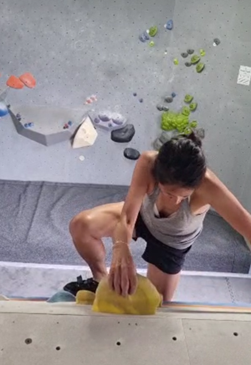Jacquie Tang from Sydney Australia sent me this video describing how she developed a functional gait disorder and how she used movement retraining techniques to improve.
Jacquie sent me this additional information about her story that might be helpful to users of the site.
I was diagnosed with FND (functional neurological disorder) in September of 2023 and my immediate response was relief as it wasn’t something more serious like Parkinson’s Disease. Despite having a name for my condition, I still felt hopeless as no solution was provided by my neurologist on how to treat my FND. A friend of mine suggested I try distraction activities such as an obstacle course or tossing a ball. This worked to some extent but in the end, I saw a neurological physio who provided me with a toolbox to help manage my symptoms. However, most of the techniques I have found useful have been through my own self-discovery and finding creative ways to deal with this naughty child which I have named Funky Nellie Delta. Like a naughty child, she will play up if I pay too much attention to her, if I am physically or mentally tired or overstimulated. Before FND I could do multiple activities in a day but since FND I tire more easily and can only do a few things. I have learnt the key to managing my symptoms and energy levels is to balance my day by including restful activities such as napping, meditating, yoga, acupuncture pottery or drawing. All of these activities help calm my nervous system and reset it so it does not become overloaded. If I do an activity that is quite tiring the biggest thing that has helped is to rest after that activity. By resting my depleted battery it has a chance to recharge. I have learnt that if you push the body either mentally or physically beyond its limits it can cause adversities. As my acupuncture says “Your issues are in your tissues”
Helpful tools that worked for me
A lot of what works is individualised and it is an experimental process where different things work for some and not others. It is a bit of trial and error. For example when I am in the kitchen sometimes my leg would lock as I stopped. I started to use my hand like it was as brake and this helps.
How I manage flare ups and relapses
FND is now more in the background and I am constantly improving as the neurological pathways reconnect. The key thing I have learnt, is it takes time and does not happen instantly. I occasionally still get flare up and this usually occurs if I have a physical injury to my body.
To manage flare-ups I keep a diary and write down what has worked for me in the past and refer back to this. I remind myself that FND isn’t getting worse and I haven’t done any damages, this is just a temporary thing and things will get better.
As much as I would prefer not to live with FND I have learnt so much about this disorder and the world of FND is no longer a stranger to me. I have the tools to deal with her strange behaviours and symptoms. As a friend said to me “ in a way FND has enhanced your life, as it has had you focus on living.” And that it has, there is no stopping me. Recently, I started indoor rock climbing and what a distractor! My best friend gave me a bracelet, which is my new motto: “She believed she could so she did.”
The sky’s the limit if : you can get the right help, find tools that work and most of all understand and accept the diagnosis.



We will be re-directing you to the University of Edinburgh’s donate page, which enable donations in a secure manner on our behalf. We use donations for keeping the site running and further FND research.
